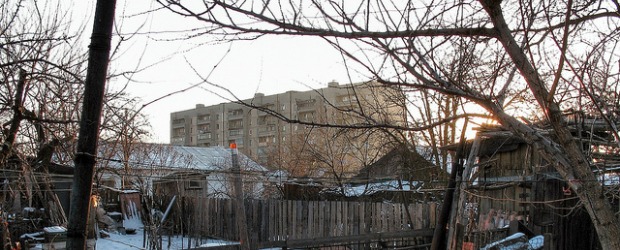You have no items in your cart. Want to get some nice things?
Go shopping
Watching news and reading articles about modern Russia in the UK, one cannot help but form an opinion that the country is solely inhabited by three groups of people: corrupt bullying mafiosi in possession of all of the country’s resources; victims of these mafiosi and various injustices; and kvas-swigging ignorant fools usually towing a captured bear along through town markets. While the first two categories are also well-represented abroad, and therefore portrayed in different analytical shows and publications primarily outside the country, the last one is portrayed as a peculiarly Russian phenomenon which makes it both exotic and entertaining at the same time.
I don’t mind this simplification. Moreover, such shows as Meet the Russians are tempting to watch as a contrast to my present life. However, occasionally attending Russian gatherings in London with the overwhelming atmosphere of money, I am myself beginning to doubt the reality of my own past and the existence of the country in which I grew up. There does not seem a slot to in which to place myself because the longing for position is so strong in modern Russia and unfortunately it is often associated not with real achievement, but with the level of income. Having money, no matter how it has been obtained, adds feathers to your cap. Sometimes it all feels like a dream – Russia the way I remember it, my childhood, our old apartment, kitchen in desperate need for repair, mountains and clouds of books everywhere. Maybe my native town Dzerzhinsk is also just a phantasmagoria.
Not to be misunderstood, I think that discussing Russia’s political situation and its often damaging governmental decisions is of extreme importance, especially with all the events that are unfolding. Yet reducing the entire understanding of the country to the presentation of its current socio-political circumstances is not particularly inspiring. Quite regularly at parties or events here I have to respond to enquiries about whether my father is an oligarch, whether I am a homophobe, what my opinion on Putin is and whether, if I go back, I will immediately be sent to Siberian prison. Tired of stating the obvious, I once tried joking with a young British man working in a financial sector by saying that the most important quality in a Russian president is the way he looks without a shirt. To this my conversationalist sternly responded that Putin is a dictator and it must be really scary to live in Russia, adding with a slight hesitation that he had never been there. To do him justice, after he expressed his opinion in that matter, he quite quickly moved on to talking about the “stupidity of Americans”, finding this topic more fulfilling because he had actually visited the United States and “saw it all for himself”.
Living in a society that is so well-provided with international news and reports on any subject under the sun can be challenging. With the everyday showers of information, it is easy to form opinions and feel yourself part of events happening in the most remote corners of the world without actually visiting them. But curiosity is also important, and that’s what at times I feel is slightly lacking – people being interested in, how can I put it… more unexpected stories about Russia and its complex national identity. Especially because the town in which I was born has a story worth telling.
I grew up in Dzerzhinsk, one of the most notorious towns in European Russia – a centre of chemical production and, as a result, severe chemical pollution. My family initially came from Moscow, but during the fifties my Jewish grandfather and my Russian grandmother were sent to work in the production sector in Dzerzhinsk. There they quickly found themselves surrounded by other Jewish-Russian families, established friendships, and built a completely new and reasonably successful life. Today this eviction of Jewish and Russian intellectual families out of Moscow in the Forties and Fifties is seen in a different light, but for my grandfather this move did not only possibly save his life, but also provided him with unexpected opportunities. He steadily climbed the career ladder and even managed to become a factory director.
Sixty years later, Dzerzhinsk is a strange sight. As most of its inglorious production stopped at the beginning of the Nineties, it is now developing in a slow and peculiar way. While the ecological situation has certainly improved, the town has gradually lost any possible meaning it had ever had. Moving out of it is not a choice, but a necessity for many young people, including me. Lazy, gloomy, unbearably Soviet, Dzerzhinsk could be the perfect location for shooting a movie about a brutal totalitarian regime, but in reality it might be seen as scary for a completely different reason – its absolute lack of any visible creativity. You can criticize the government as much as you like – nobody would pay any attention to it; just as much as if you smash your head to bits trying to write poetry and be listened to. Walking down the main street, you can see a lot of grocery and clothes shops, some occasional cafes and grotesque God-and-world-forgotten huge empty factory buildings on the outskirts. How dystopian and sad is the place without creativity, how scarred is the society which prioritizes making money over anything else. And maybe that is where part of the answer about overwhelming commercialization in Russia lies – the country is so deeply traumatized and exhausted after all the events and tragedies of the 20th century that it can’t concentrate on creating beauty. It reminds me of Max Ernst’s painting ‘Europe after the Rain’, in which a dead carcass of a town is standing under a blue sky. Will the plants eventually grow out of it and bring it back to life? Or will it fall down, with something new and exciting being created in its place?
As lifeless as my town looks, there could be movement underneath – maybe only in the thoughts expressed during conversations over tea in shabby or modern, tiny or large kitchens; the same creativity that is already splashing here and there in Moscow and St Petersburg finding expression in peaceful protests, gatherings, art spaces. This creativity has always been represented by people of different nationalities, religions, sexual orientations, races – Pushkin, Tchaikovsky, Mandelshtam, Pasternak – but somehow seems to be missing at the moment. Yet it cannot fail to exist, even if at the moment it looks as though society is purely focused on being financially successful. It must be there, as it always has been, despite repressions, hardship and corruption, despite its own difficult past and complicated present.
One of my best friends is a doll-maker. She produces astonishing, unusual characters, which are unique and beautiful. She first draws them on paper, deciding on their identity and outfit. She then forms their shapes out of metal and finally comes up with faces, clothes and individual special features. Each doll takes a couple of months to finish and is a piece of art. She has never tried doing anything with them, so they are standing in her bedroom looking at you with a curious, excited look of expectation – sad ballerina, embarrassed emperor, medieval fresco painter… “One day there might be an opportunity to show them somewhere,” she usually responds when I comment on their brilliance, “For now I just don’t have time”. She is also busy making her living.
How complicated the relationship with my unimpressive, rather ugly place of origin is, and how even more so the relationship with my country. How passionately I wanted to run away from it when I was a child, imagining myself living in a multi-cultured, interesting metropolitan place having erased the memory of the past. And now that I am actually living in one of the most beautiful cities in the world, I find myself realizing that no matter where I am based and what I am trying to achieve, I will always be from Dzerzhinsk. If I ever decided to delete the memory, like a character from Eternal Sunshine of the Spotless Mind, I would be left empty.
This town is a part of me, and I refuse to admit that there are places in the world which can exist without beauty. Some are just taking their time to reveal it.

About Tatyana Movshevich
Tatyana Movshevich is a Russian writer and journalist who lives and works in London. Most of her published short stories and essays are in Russian, but over the last few years she also began writing in English. This gives her an opportunity to compare different ways of thinking and how they are tied to languages. While living in Mae Sot on the border between Thailand and Burma she founded an English-language literary magazine ‘Tea Leaf Salad’. In the past Tatyana worked for an antiracism organisation ‘UNITED for Intercultural Action’ based in Amsterdam.




Valuable to be reminded to complicate our rather lazy ideas of Russia (and America). There’s always more, as this article shows.
Yes i took a trip round the town with Google Maps and it made me think of my old hometown of Coatbridge, over in Scotland. Industrial towns that have went down hill….it’s all very sad and not a pretty sight.